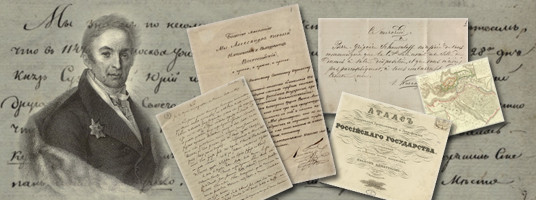Nikolay Karamzin (1766-1826)

The collection is devoted to the 250th birth anniversary of the famous Russian historian, writer, publicist Nikolay Karamzin. It features research, essays and archival documents about the life and work of Karamzin; his literary and scientific heritage, including his main work History of the Russian State; correspondence; video lectures revealing the collections of various libraries related to Nikolay Karamzin; projects and photographs of monuments.
The life and work of Nikolay Karamzin covered many areas of life. He went down in history as a reformer of the Russian language as he was the first who used the letter ё (yo) and enriched the language with a large number of neologisms. The literary creativity of Karamzin gave rise to a new trend - sentimentalism, the foundations of which he claimed in his critical articles.
The publishing activity of Nikolay Karamzin is also remarkable. He was the editor of Moskovsky Zhurnal (Moscow Journal), Vestnik Evropy (Herald of Europe), published the first Russian anthologies - Aglaia and Aonide. In his political articles, the publisher submitted recommendations to the government, pointing to the role of education in society.
The basis of the identity of Russian culture Nikolay Karamzin saw in the study of history. In 1804, as a court historian, he initiated the establishment of the History of the Russian State, on which he worked until the end of days. It included eight History volumes in the first edition of the 1816-1817 period. In 1821, as part of the second edition, the 9th volume on the reign of Ivan the Terrible was released, in 1824 - the 10th and the 11th devoted to Fedor Ioannovich and Boris Godunov. The work on the 12th volume was not completed.
The collection involved materials from the collections of the Russian State Historical Archives, the State Archives of the Russian Federation, the Russian State Library, the N. K. Krupskaya Moscow Regional State Scientific Library, the State Public Historical Library, the M. Gorky Scientific Library of St. Petersburg State University, the Central Naval Library, the Herzen Russian State Pedagogical University Fundamental Library, the Vladimir Regional Universal Scientific Library, the Franko Crimean Republican Universal Scientific Library, the Samara Regional Universal Scientific Library, the Sverdlovsk Regional Library for Children and Youth, the Pushkin Tambov Regional Universal Scientific Library, the Tula Regional Universal Scientific Library, the Ural Federal University, the Federal Protective Service of the Russian Federation, the Russian Geographical Society, the Children's Postcard Museum.




